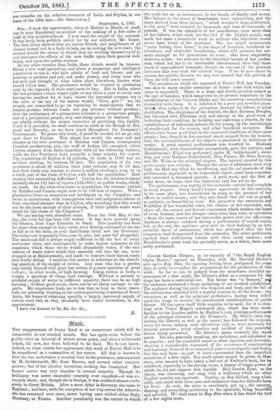Voir.
THE reappearance of Jenny Lind is an occurrence which will be memorable in our musical annals. She has again come before the public after an interval of almost seven years, and after a retirement which, till now, has been believed to be final. We do not know, indeed, to what extent her appearance this week at Exeter Hall is to be considered as a resumption of her career. All that is known is, that she has undertaken a musical tour in the provinces, accompanied by M. Goldschmidt, Mr. Sims Reeves, and several other eminent artists ; but of her ulterior intentions nothing has transpired. Her former career was very singular in several respects. Though its brilliancy was never exceeded—scarcely ever equalled—it was ex- tremely short; and, though she is foreign, it was confined almost exclu- sively to Great Britain. After a mere abut in Germany she came to England ; and here, withthe exception of her trip across the Atlantic, she has remained ever since, never having once visited either Italy, Germany, or France. Another peculiarity was the extent to which
she made her art an instrument, in her hands, of charity and mercy. Her labours in the cause of beneficence were unremitting, and the sums derived from these labours, " which wander'd, heaven-directed, to the poor," were counted by thousands, and tens of thousands, of pounds. It was the splendour of her munificence, even more than of her talents, which made her the idol of the English people, and made her name a household word to millions who otherwise would never have heard of her existence. She has raised monuments "more lasting than brass," in the shape of hospitals, beneficent in- stitutions, and charitable foundations, which will preserve her me- mory amongst us for generations to come. One more singularity deserves notice : her aversion to the theatrical branch of her profes- sion, which led her to its irrevocable abandonment after only three years of unparalleled triumphs, though she was one of the aTeatest actresses that ever trod the musical stage. If she be now about to resume her artistic labours, we may rest assured that this portion of them she will never resume.
The occasion on which she appeared at Exeter Hall, last Tuesday, was akin to many similar occasions of former years with which her name is associated. There is a large and closely-peopled suburb in the cast of London, which has grown to its present magnitude by the establishment of the Victoria Docks and the numerous manufactories connected with them. It is inhabited by a poor and crowded papa- laticat, often reduced, by the precarious demand for labour, to great destitution. The clergyman of the district, the Rev. Herman Douglas, has laboured with Christian zeal and energy in the good work of bettering their condition, by building and endowing a church, by the establishment of industrial schools for the young, by the introduction of needlework for the women, and other beneficial measures. His efforts have borne good fruit in the improved condition of these poor people; but, though he has received much support from the benevo- lent, the accomplishment of his objects is prevented by deficiency of means. A great musical performance was resorted to. Madame Goldschmidt, with characteristic promptitude, gave her services, and Mendelssohn's Elijah was performed, under M. Goldsclunidt's direc- tion, and with Madame Goldschmidt, Miss Palmer, Mr. Sims Reeves, and Mr. Weiss as the principal singers. The interest created by this performance was extreme. Though the rates of admission were very high, the Hall was filled to overflowing, and the eel proceeds of the performance, applicable to its benevolent object, must have consider- ably exceeded a thousand pounds. A good work, and the first of many more, we hope, that this illustrious lady has yet to do.
The performance was worthy of the occasion—careful and complete in every respect. Jenny Lind's former appearance in this oratorio, in the same place, was remembered by many as the greatest of her efforts in sacred music ; and they now found that she was as grand, as pathetic, as beautiful as ever. She preserves the sweetness and flexibility of her wonderful voice, the charms of her execution, and, above all, the earnest and fervent expression which reaches the heart of every listener, and has always—more even thau voice or execution —been the main source of her irresistible power over the affections. Applause is always subdued during a performance of sacred music, but, at the end, the audience gave vent to their feelings by an irre- pressible burst of enthusiasm, which was prolonged after the fair songstress had disappeared from the orchestra. The other performers exerted their well-known talents with their usual success; and Mendelssohn's great work has probably never, as a whole, been more nobly performed.






























 Previous page
Previous page